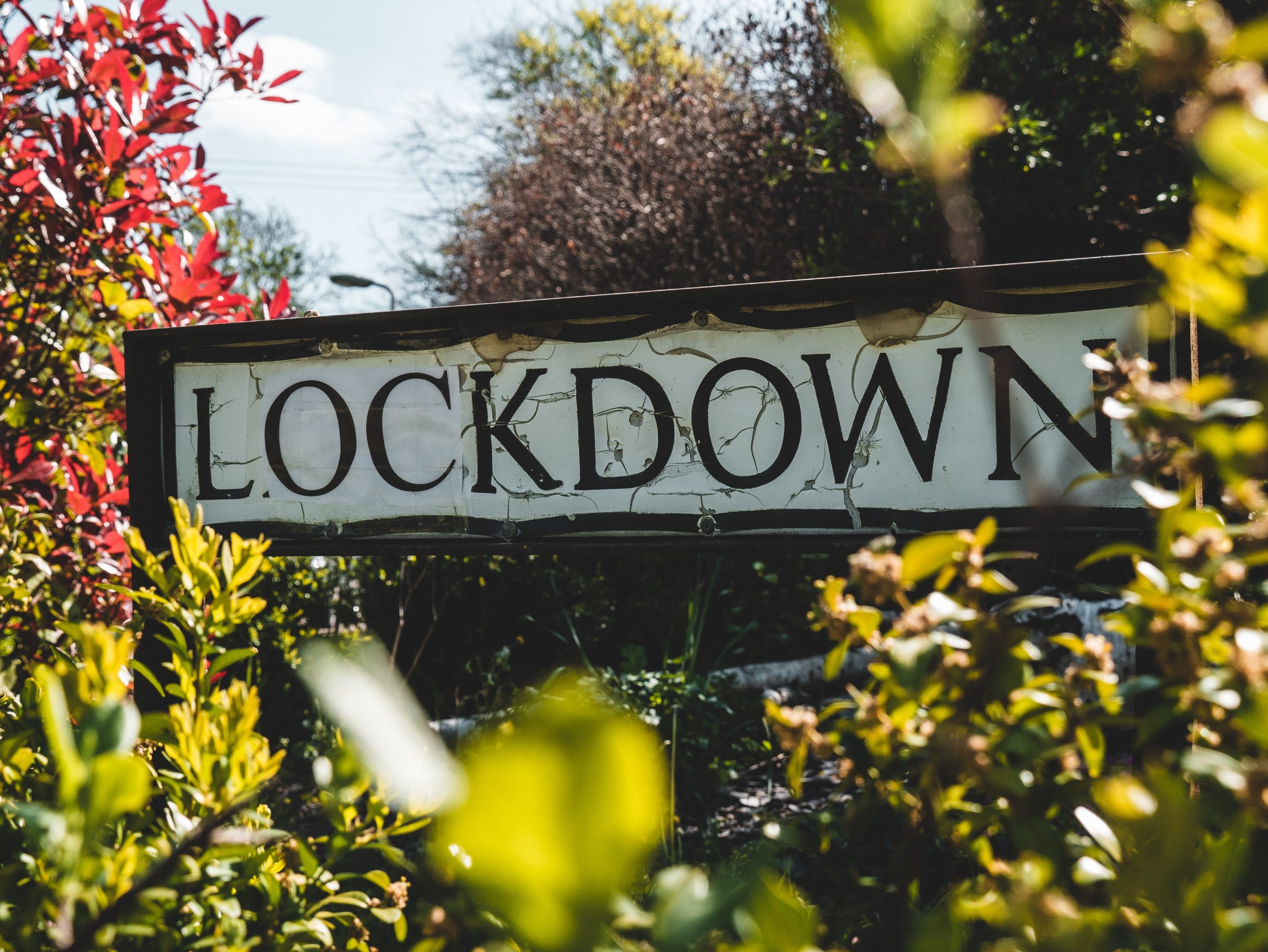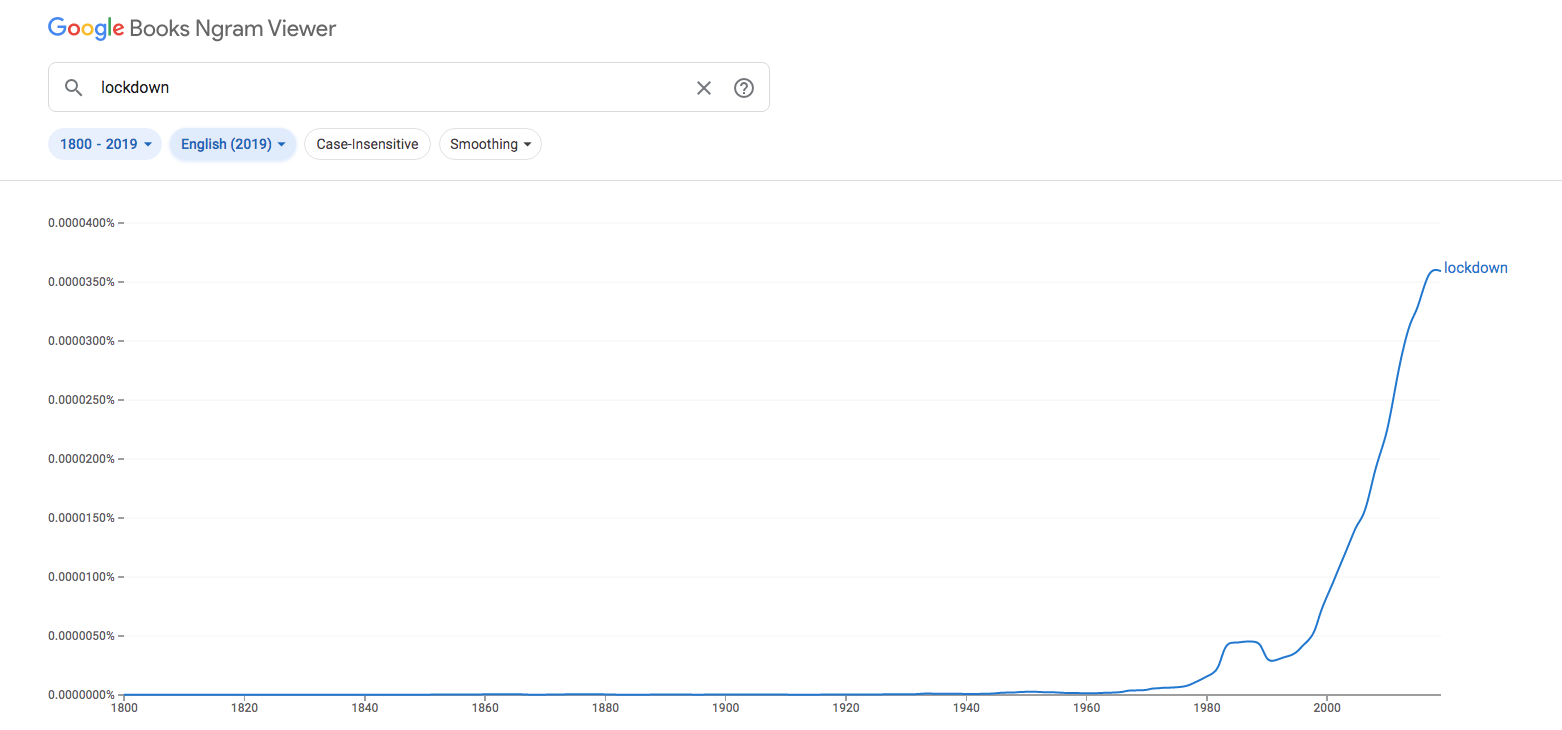
August 7, 2020, by Brigitte Nerlich
The meaning of lockdown
The other day, my father in Germany, who is quite old, phoned me and asked what lockdown meant.* ‘Lockdown’ is now used in Germany instead of more native words like ‘Ausgangssperre’ (exit barrier, if you like). He especially wondered about the ‘down’ bit, as he understood the ‘lock’ bit and also had heard about ‘locking up’, say, a hotel room.
To explain the ‘down’, I invented a story about a portcullis coming down to shut out the enemies trying to overrun a castle! Nice story, but, as I later found out, no cigar, so to speak. Pure folk etymology. When homing in on the real etymology, things turned out stranger than I thought.
So, what’s the etymology of ‘lockdown’? To find out I went to the Oxford English Dictionary and was quite surprised.
Pegs and boats
Apparently, the word is of North American origin and originally referred to “a piece of wood used in the construction of rafts when transporting timber downriver, consisting of a strip or branch bent around the horizontal poles and secured into holes in the logs. Later: a peg, pin, or similar device used to fasten something in place”.
The first example of this usage is, apparently, from 1832: “That it shall be the duty of said corporation to raft all lumber in said boom without any unnecessary delay, securely and faithfully with suitable poles and lock-downs.” The word was still used in that sense in 2012 and when I rummaged around the internet, I found phrases like ‘lockdown frame’ and ‘lockdown device’.
Bolts and prisons
It would take another century for the modern sense of ‘lockdown’ (related to ‘to lock down’) to emerge, as in: “The confinement of prisoners to their cells for an extended period of time, usually as a security measure following a disturbance; the time at which such confinement begins. Also in the context of a psychiatric hospital or other secure unit.”
The first use listed is from 1973: “A full-scale lockdown..was imposed immediately after the knifing”. One can almost hear the prison stuff shooting the bolts in the prison cells… or indeed pegs or pins or similar devices …
Containment and security
In the 1980s this sense of ‘lockdown’ flourished together with the more general one of “a state of isolation, containment, or restricted access, usually instituted for security purposes or as a public health measure; the imposition of this state”.
Interestingly, the first attestation of that sense is from 1984 in the context of nuclear power (and here one can really imagine the hoot hoot of the lockdown siren): “They instituted a ‘security lockdown’ at the PUREX plant Monday when a can containing..plutonium sludge was found to be missing.”
It was barely two years later, in 1986 (and this is not in the OED) that the most famous nuclear reactor ever, at Chernobyl, went into what one might call lockdown.
At the beginning of the pandemic there was talk of ‘China’s Chernobyl’, followed soon after by ‘Trump’s Chernobyl’ and lockdowns happened all over the world.
It is therefore not surprising to read in an article on Covid and Chernobyl by Philippa Holloway: “Today, we might draw comparisons between the complex psychogeography at play in Chernobyl ‘stalkers‘ breaking into the exclusion zone (their ancestral homeland) to eat food and drink water that may be contaminated with radiation as way of reclaiming the space, and the young people breaking lockdown restrictions to inhabit community spaces with friends – a coping mechanism in response to COVID-19 anxieties.”
To come back to the OED: The last entry for this sense of lockdown says: “2020 Maldon & Burnham Standard (Nexis) 21 June It’s been nearly three months since the lockdown was officially imposed in the UK to slow the spread of the coronavirus.”
The rise of lockdown
Apart from consulting the OED, I also looked at Google Ngram viewer, which charts the frequency of words based on all the books Google has scanned. As one can see from this graph, lockdown gradually became popular, in the sense of prison lockdown at first, in the 1960s and 70s, and then picked up speed in the 80s and 90s, after a little wobble, to expand into more general use.
Some of the more recent books used by the Ngram algorithm make for interesting reading. There are, for example, books on school lockdowns because of gun violence, about the locking up of children at the US borders and much more, including lots of thrillers. One book title in particular, from 2016, caught my eye: Caught: The Prison State and the Lockdown of American Politics, by Marie Gottschalk. As one can see, ‘lockdown’ can also be used as a rather pertinent political metaphor.
I also found one book from 2018 (!) entitled Pandemic Lockdown Journal, by Leonard Payne, which “provides essential information in case of a sudden pandemic lockdown or self-quarantine. The volume also provides the space for personal journaling during this difficult time.” The cover is decorated with a yellow biohazard sign against a black background. This shows yet again that we knew a pandemic was coming! (Unfortunately, the book seems to be unavailable at present!)
My home is my castle
After having talked to my father in the morning, looked at the OED at lunchtime and started to write my post in the afternoon, I then had my regular facetime session with my sister and told her about my exploits.
She laughed and told me that this reminded her of when she was teaching German to English kids and tried to explain the history of the word ‘Schloß’ or castle. She told her students that it came from the word ‘schliessen’ which means to lock – and, indeed, the German word for ‘lock’ is ‘Schloß’.
I quickly looked into the etymology of ‘Schloß’ (in the castle sense) and found this nice account on Reddit: “’Schloss’ and ‘schließen’ (to close) are from a Proto-Germanic verb *sleutaną or *slūtaną meaning to lock or close, probably from a Proto-Indo-European verb *(s)kleh₂ud-, from a noun, *klau-, with the meaning of a hook, or a forked branch used as a bolt. There don’t appear to be any cognates via Old English, however … The English word ‘slat’ and one meaning of ‘slot’ were borrowed from the Dutch cognate, originally in the sense of a piece of wood that could be used to bar a door.”
And there we go: We are back to pieces of wood, especially bolts, pegs, slats and so on, which tie lockdown to boats and prisons, and perhaps castles after all.
Under lockdown, our homes really have become our castles, with bolts and locks, and perhaps a portcullis and all! This can give a sense of security but can also feel like imprisonment and house arrest…
PS 26 October, 2020, A great post on the changing and varied meanings of ‘lockdown’ by Tim Harford
*And I now found some German reflections on the word here.
Photo by Matt Seymour on Unsplash
No comments yet, fill out a comment to be the first

Leave a Reply